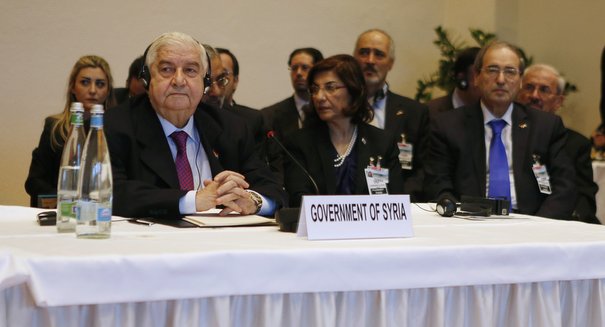With all eyes on the Syrian exile opposition—which has been preparing for today’s Syrian peace conference, known as Geneva II, the traditional way, with infighting and splits—much less attention has been paid to the Syrian government’s own strategy at the talks. President Bashar al-Assad is sending a delegation composed largely of veteran diplomats, politicians and media specialists, led by Foreign Minister Walid Muallem. According to the Syrian president, they are going to the talks in order to discuss the best way to “fight terrorism” in Syria.
The president’s deputy as leader of the Baath Party, Hilal Hilal, has allegedly told a congress of trade union leaders in Damascus that he expects the Geneva II talks to be a “picnic” for the Syrian delegation. But Hilal also took pains to reassure his listeners that there would be no concessions to the opposition or to the international community. Rather, he said, echoing the president’s rhetoric, Muallem would be at the conference only to “legitimize the heroic work that our army is performing against terrorism.”
Sami Kleib’s Seven Points
Such statements are mostly propaganda, of course. A more insightful analysis of the government’s strategy comes from Sami Kleib, news director at the al-Mayadeen television channel in Beirut. He recently penned an article for Lebanon’s al-Akhbar daily in which he argues that the Syrian government is going to Geneva “firstly to please its Russian ally, and secondly to impose an agenda that embarrasses the opposition further.” Kleib suggests there are seven points on which Muallem’s delegation will focus:
1. Muallem’s recent proposal for a ceasefire in Aleppo.
While this helps the government seem conciliatory and has gained a lot of positive press attention, it is not a realistic proposal. Rather, it is designed to underline the fractiousness of Syria’s opposition and the futility of engaging with it. All Aleppine rebel groups of any consequence have already condemned the opposition’s delegation to Geneva, and there is simply no way the exiles could sign a ceasefire and make it stick.
2. The delegation will not discuss any transfer of power from Assad under any circumstances (despite the fact that the Geneva communiqué, a document signed in June 2012 at an international conference on resolving the Syrian conflict, prescribes the “establishment of a transitional governing body” with “full executive powers”).
3. The government negotiators will try to move any upcoming peace talks—Geneva III, IV, and so on—to a location inside Syria, in order to de-internationalize the conflict and gain closer control over proceedings.
4. “The official negotiating delegation is not empowered to accept any point without first returning to the president. This is to consecrate the president’s role as a partner in the talks.” (But note the oddly specific qualifier: “official.”)
5. The delegation will accept some deliveries of humanitarian aid but seeks to keep them under strict government control.
6. The delegation can accept a mechanism for prisoner exchanges—also recently endorsed by Muallem—but will make sure that it that excludes those captives who are accused of links to “al-Qaeda or terrorist organizations.”
7. The delegation will fight against opposition demands for a time limit on the talks.
This last point is straight out of former Syrian president Hafez al-Assad’s playbook. As can be attested to by a host of Lebanese warlords and Arab governments, as well as some Israelis and Americans, both presidents Assad have proven themselves to be expert procrastinators. Their respective regimes have turned intransigence into an art form, routinely letting negotiations bog down on points of procedure while pressuring opponents relentlessly through other means. More often than not, this pain-inducing waiting game has been about stalling the plans of outsiders as a way of buying time until the frustrated foreign patrons of the Syrian government’s local enemies decide to pick up their chips and leave.
Inside Information?
As an agenda for the Assad government’s Geneva delegation, these seven points ring very true. But analysts will differ, and while Kleib may be a well-connected and influential newsman, why should we listen to him on this issue?
Well, for one thing, Kleib is married to Luna al-Shebel, who works as the Syrian presidency’s director of media and communications. And as it happens, Shebel is currently in Geneva as part of Muallem’s delegation.
His marriage to a member of Assad’s negotiating team doesn’t prove that Kleib’s seven points reflect official Syrian thinking—but these points should at least be taken as a very highly educated guess.
CORRECTION: I have learned that at the time this post was published, Sami Kleib was no longer married to the director of Bashar al-Assad’s media office. My apologies for the mistake. –Aron Lund, editor of Syria in Crisis.






